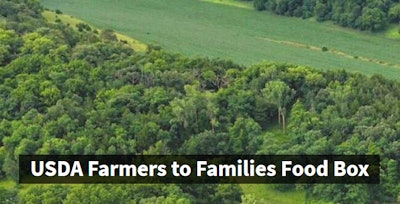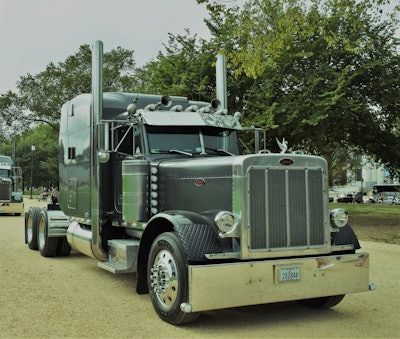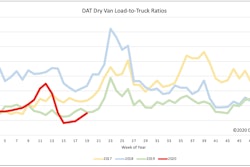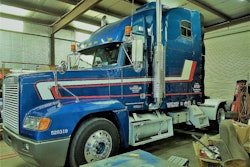
First, an idea floated by one Bill Ater in a conversation we had a few weeks back. Ater regular readers will recall most recently for the paint and other work he spent copious downtime putting into his truck. The big idea’s something he wrote one of his Senators in Texas about, seeing the news reports we’ve all seen about a surge in demand at food banks around the nation and food right from the fields and/or dairies going straight to waste or just not getting to where it’s needed most.
“All this food’s being dumped and plowed under” without a paying market, he said. “A guy up in Idaho’s got 500,000 pounds of potatoes in a big ol’ mountain and telling people to come and get it. Small farmers are taking stuff to food banks in small quantities.” Why not, he suggested, put a known produce broker over a surplus federal buy program to go direct to food banks? “I thought, ‘Man, that’s something that could very easily be done, and put truckers to work.”
Turns out, just as Bill and I we were talking back a few weeks ago, a similar program was just getting under way in the form of $1.2 billion worth of federal purchasing in a “Farmers to Families Food Box Program” at the USDA. It’s not just a single contract, but rather a multiplicity that have been awarded (though with some reportedly pulled back after the speed at which contracts were approved allowed some entities of questionable expertise to slip through the cracks, according to reports today).

Nonetheless, can we credit owner-operator Bill Ater with the idea? Hey, why not. (Tip of the hat to you, Bill.)
More seriously, find the program’s approved contractors for your region at this link.
One way to steer the negotiation up from a lowball rate offer
Some of you may have heard Oklahoma-based Generations Express independent Bryan Hutchens talk a bit about this tactic in last week’s Overdrive Radio podcast episode. He deploys it when confronted with a broker’s lowball rate offer that would either:
- Barely be profitable, or
- A straight-up losing proposition for him.
 View from the passenger side on owner-operator Hutchens’ 1996 Pete.
View from the passenger side on owner-operator Hutchens’ 1996 Pete.The tactic is a simple one, Hutchens says, though I’ll say the point may have been missed if comments are any indication.
“A lot of the time, I’ll kind of knock people off their feet when they get on the phone with me,” Hutchen says. “They’ll call me and offer me some kind of $1.20-a-mile rate.”
If they go extremely low, he goes extremely high. “I’ll throw $10 a mile back at them,” Hutchens says.
Predictably, the broker reacts with disbelief, at which point comes the most important thing in the whole exchange — redirecting the energy of the exchange, using a little humor.
Says Hutchens, “I go, ‘Hey, my rate’s just as ridiculous as yours is, so let’s see if there’s a place we can work together.’ ”
It’s all in the tone, of course, and can get the conversation started in earnest, Hutchens says. In cases where it works, it also lets the broker know they’re not dealing with “somebody who’s just trying to get a truck home” for no profit.
In a cash pinch, paying to stop the truck is …
… maybe not a preferred option, as every little bit helps.
This note came in from a reader over last weekend:
In Jacksonville, Florida, it cost us $40 for two days either paid parking or get something to eat. At Murfreesboro, Tenn., then, 3/4 of the parking lot is reserved. Had no money to park. I drive at night — truck stops are full by 1600 hours. What are we supposed to do? Rates are so bad we can’t make a living.
I’m sure truck stops are wanting for revenue just like many truckers, and plenty truckers do rely on the ability to reserve a space. Yet in a time like this, it feels like 3/4 of a lot is a bit much? There’s got to be a better balance that can be found to serve truckers’ cash reserves and/or operational imperatives.










